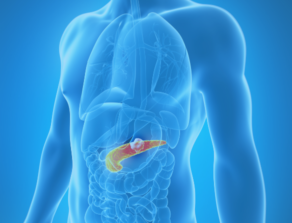Pancreatic Cancer
About Pancreatic Cancer
Pancreatic cancer is the seventh and tenth most commonly diagnosed cancer in women and men, respectively, in the U.S. It is the third and fourth deadliest cancer for women and men, respectively. It is one of the few cancers for which survival has not improved substantially in over 40 years.
Pancreatic Cancer Key Facts
- An estimated 66,440 new cases of pancreatic cancer will be diagnosed in the U.S. in 2024, with 51,750 deaths expected to result from the diagnosis.
- Pancreatic cancer is expected to become the 2nd leading cause of cancer-related deaths in the U.S. by the year 2040.
- Most cases (92%) of pancreatic cancer occurs in the cells that make enzymes to digest food
- Pancreatic neuroendocrine tumor or NET is rare with a better prognosis
- The overall five-year survival rate for pancreatic cancer is just 13%.
- Risk factors for developing pancreatic cancer include tobacco use, overweight and obesity, heavy exposure to certain chemicals, family history of the disease, age, chronic (often with heavy alcohol consumption) or hereditary pancreatitis, and long-standing type 2 diabetes. Individuals with Lynch syndrome and certain other genetic syndromes, as well as BRCA1 and BRCA2 mutation carriers, are also at increased risk.
Source: American Cancer Society’s Cancer Facts & Figures 2024 and American Society for Clinical

- Quit smoking
- Avoid alcohol
- Adopt a healthy diet and maintain a healthy weight
- Avoid chemical exposure
- Regular health screening
Resource: Can Pancreatic Cancer Be Prevented? | American Cancer Society
- Belly or back pain
- Jaundice – includes dark urine, light-colored stools, and itchy skin.
- Weight loss and poor appetite
- Nausea and vomiting
- Gallbladder or liver enlargement
- Fatigue
- Blood clots
- Diabetes
Source: American Cancer Society’s website 2024
- Age – Almost all patients are older than 45. About two-thirds are at least 65 years old. The average age at the time of diagnosis is 70
- Sex – Men are slightly more likely to develop pancreatic cancer than women.
- Race/Ethnicity – African Americans are slightly more likely to develop pancreatic cancer
- Tobacco use
- Alcohol consumption
- Obesity
- Diabetes
- Family history
- Hereditary syndrome
- Hereditary breast and ovarian cancer syndrome (HBOC)
- Hereditary breast cancer, caused by mutations in the PALB2 gene
- Ataxia telangiectasia (AT)
- Familial atypical multiple mole melanoma (FAMMM) syndrome
- Hereditary pancreatitis
- Lynch syndrome
- Peutz-Jeghers syndrome
- Chronic pancreatitis
- Workplace exposure to certain chemicals
- Carcinogens used in dry cleaning
- Metal working industries
Resource: Pancreatic Cancer Risk Factors | American Cancer Society
NFCR-Supported Researchers Working on Pancreatic Cancer
Danny R. Welch, Ph.D.
University of Kansas Cancer Center
Yung-Chi Cheng, Ph.D.
Yale University
Daniel D. Von Hoff, M.D., FACP
Translational Genomics Research Institute (TGen)














